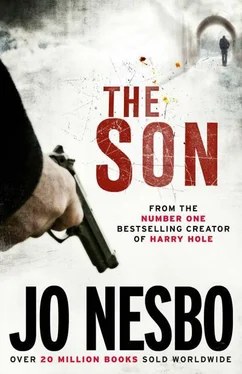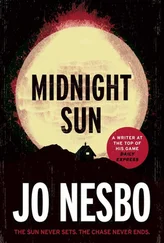Jo Nesbo - The Son
Здесь есть возможность читать онлайн «Jo Nesbo - The Son» весь текст электронной книги совершенно бесплатно (целиком полную версию без сокращений). В некоторых случаях можно слушать аудио, скачать через торрент в формате fb2 и присутствует краткое содержание. Год выпуска: 2014, Издательство: Random House, Жанр: Триллер, на английском языке. Описание произведения, (предисловие) а так же отзывы посетителей доступны на портале библиотеки ЛибКат.
- Название:The Son
- Автор:
- Издательство:Random House
- Жанр:
- Год:2014
- ISBN:нет данных
- Рейтинг книги:3 / 5. Голосов: 1
-
Избранное:Добавить в избранное
- Отзывы:
-
Ваша оценка:
- 60
- 1
- 2
- 3
- 4
- 5
The Son: краткое содержание, описание и аннотация
Предлагаем к чтению аннотацию, описание, краткое содержание или предисловие (зависит от того, что написал сам автор книги «The Son»). Если вы не нашли необходимую информацию о книге — напишите в комментариях, мы постараемся отыскать её.
The Son — читать онлайн бесплатно полную книгу (весь текст) целиком
Ниже представлен текст книги, разбитый по страницам. Система сохранения места последней прочитанной страницы, позволяет с удобством читать онлайн бесплатно книгу «The Son», без необходимости каждый раз заново искать на чём Вы остановились. Поставьте закладку, и сможете в любой момент перейти на страницу, на которой закончили чтение.
Интервал:
Закладка:
‘Good,’ she said. ‘Now try driving in figures of eight.’
He did as she said and revved the engine a little, but when the revs increased, he instinctively took his foot off.
‘The police came by the other day,’ Martha said. ‘They wanted to know if we’d handed out any new trainers. It was because of the Iversen murder, if you’ve heard about that.’
‘Yes, I’ve read about it,’ he said.
She looked at him. She liked that he had been reading. Most of the residents never read a single word, didn’t absorb any news, didn’t know who the Prime Minister was or what 9/11 meant. But they could tell you to the nearest krone what speed cost anywhere, the purity of heroin and the percentages of active ingredients in any new pharmaceutical product.
‘And talking of Iversen, wasn’t that the name of the man who might be able to get you a job?’
‘Yes. I went there, but he doesn’t have anything now.’
‘Oh, what a shame.’
‘Yes, but I’m not going to give up, I have more names on my list.’
‘Great! So you have a list?’
‘Yes, I do.’
‘Why don’t we try changing gears?’
Two hours later they were racing down Mosseveien. She was driving. To one side the Oslo Fjord glittered in the sunshine. He had proved to be a quick learner. There had been some trying and failing with gear-changing and the clutch, but once they had resolved that, it was as if he simply programmed his brain to remember any action that had worked and repeated it, automated it. After three attempts at hill starts, he could do it without using the handbrake. And when he had understood the geometry of parallel parking, he mastered it with an almost irritating deftness.
‘What’s that?’
‘Depeche Mode,’ he said. ‘Do you like it?’
She listened to the chanting, two-part vocals and the mechanical rhythm.
‘Yes,’ she said, turning up the volume of the CD player. ‘It sounds very. . English.’
‘True. What else can you hear?’
‘Hm. Cheerful dystopia. As if they don’t take their own depression all that seriously, if you know what I mean.’
He laughed. ‘I know what you mean.’
After some minutes on the motorway, she turned off towards Nesoddtangen peninsula. The roads grew narrower, the traffic lighter. She pulled over and stopped.
‘Are you ready for the real thing?’
He nodded. ‘Yes, I’m ready for the real thing.’
He had replied with a passion that made her suspect he was talking about more than just driving a car. They got out of the car and switched places. She watched him sit close to the steering wheel and look straight ahead, concentrating. He pushed the clutch down and put the car in gear. He pressed the accelerator carefully and tentatively.
‘Mirror,’ she said, while checking the rear view herself.
‘All clear,’ he said.
‘Indicator.’
He flicked the indicator, muttered an ‘on’ and gently released the clutch.
Slowly they moved out onto the road. With the revs slightly too high.
‘Handbrake,’ she said and grabbed the stick between them to release it. She felt his hand come across to do the same, touch hers and flinch as if he had burned himself.
‘Thank you,’ he said.
They drove for ten minutes in total silence. They let a driver who was in a hurry overtake them. A trailer truck came towards them. She held her breath. She knew that on the narrow road, she would — even though she knew there was room for both of them — automatically brake and pull to the side. But Stig wasn’t daunted by it. And the strange thing was that she trusted him to make the right call. The male brain’s innate understanding of three dimensions. She saw his hands resting calmly on the steering wheel. And she concluded that he lacked the very trait which she had in abundance; the tendency to doubt her own judgement. She could see from the fine, thick veins on the top of his hand how calmly his heart was pumping out blood. Blood to his fingertips. She saw his hands turn the steering wheel quickly, but not too far to the right, when the rush from the truck took hold of the car.
‘Wow!’ he laughed with excitement and looked at her. ‘Did you feel that?’
‘Yes,’ she said. ‘I felt that.’
She directed him to the tip of Nesodden and up a gravel track where they parked behind a row of low houses with small windows at the back and large windows overlooking the sea.
‘Renovated holiday cottages from the 1950s,’ Martha explained as she walked in front of him down the path through the tall grass. ‘I grew up in one of them. And this was our secret sunspot. .’
They had reached a rocky point. Below them lay the sea and they could hear the gleeful squealing of children splashing. A short distance away lay the quay with the shuttle ferry that sailed north to Oslo, which on a clear day looked as if it was only a few hundred metres away. The actual distance was five kilometres, but most people who worked in the capital preferred commuting by ferry rather than make the forty-five-kilometre trip around the fjord by car.
She sat down and inhaled the salty air.
‘My parents and their friends used to call Nesodden “Little Berlin”,’ Martha said. ‘Because of all the artists who settled here. It was cheaper to live in a draughty cottage than in Oslo. If the temperature fell too far below freezing, people would gather in the least cold house. Which was ours. They used to stay up and drink red wine until the morning because there weren’t enough mattresses for everyone to sleep on. Then we would all have a big, communal breakfast.’
‘Sounds nice.’ Stig sat down next to her.
‘Yes, it was. People here looked out for each other.’
‘How idyllic.’
‘I don’t know about that. From time to time they would argue about money, criticise each other’s art or sleep with each other’s spouses. But the place was alive, it was exciting. My sister and I actually believed we lived in Berlin until my father showed me on the map where the real Berlin was. And explained to me that it was a long way away, more than a thousand kilometres. But that one day we would drive there. And we would visit the Brandenburg Gate and Charlottenburg Palace where my sister and I would be princesses.’
‘Did you ever go there?’
‘To the real Berlin?’ Martha shook her head. ‘My parents never had very much money. And they didn’t live to be very old. I was eighteen when they died and I had to look after my sister. But I’ve always dreamt about Berlin. So much so that I’m no longer sure if it really exists.’
Stig nodded slowly, closed his eyes and lay down on his back in the grass.
She looked at him. ‘Why don’t we listen to some more of your music?’
He opened one eye. Squinted. ‘Depeche Mode? The CD is in the CD player in the car.’
‘Hand me your mobile,’ she said.
He gave it to her and she started pressing buttons. Soon rhythmic breathing sounds were coming from the small speakers. Then a deadpan voice suggested taking them on a trip. Stig looked so shocked that she had to laugh.
‘It’s called Spotify,’ she said, putting the mobile between them. ‘You can stream music from the Web. Is all this news to you?’
‘We weren’t allowed mobiles in jail,’ he said, eagerly picking up the mobile.
‘In jail?’
‘Yes, I’ve done time.’
‘You were dealing?’
Stig shielded his eyes from the sun. ‘That’s right.’
She nodded. And smiled quickly. What had she, of all people, imagined? That he was a heroin addict and a law-abiding citizen? He had done what he had to do, just like everyone else.
She took the phone from him. Showed him the GPS function and how it could tell them where on the map they were and how to calculate the shortest driving route to any place in the world. She took a photo of him with the camera function, pressed the record button, held it up and asked him to say something.
Читать дальшеИнтервал:
Закладка:
Похожие книги на «The Son»
Представляем Вашему вниманию похожие книги на «The Son» списком для выбора. Мы отобрали схожую по названию и смыслу литературу в надежде предоставить читателям больше вариантов отыскать новые, интересные, ещё непрочитанные произведения.
Обсуждение, отзывы о книге «The Son» и просто собственные мнения читателей. Оставьте ваши комментарии, напишите, что Вы думаете о произведении, его смысле или главных героях. Укажите что конкретно понравилось, а что нет, и почему Вы так считаете.











